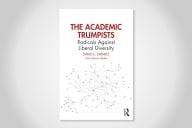You have /5 articles left.
Sign up for a free account or log in.

Ashley Ruba with one of two awards she received from the APA
Ashley Ruba via Twitter
Should scholars who earn disciplinary honors have to pay full conference registration fees to attend their award ceremonies? The notion struck a nerve with academics this week after one developmental psychologist said the American Psychological Association would not waive full registration fees for its annual meeting—happening now in Minneapolis—so that she could publicly accept two awards she’d earned.
As the scholar, Ashley Ruba, wrote on Twitter, “So, let me get this straight. I won not one, but two @APA awards. But, in order to accept these awards at the conference, I need to pay nearly $600 in registration fees. No one day pass. No fee [waiver]. No way to attend a 50 min ceremony. Conferences are a scam. I’m not going.”
Ruba also posted an email exchange with an APA conference organizer in which she asked, “So just to clarify—there is no way I can receive these awards at the ceremony unless I sign up for the whole conference (which for me would be $595, since I am not a student or an APA member)?” The APA official responded, “That is correct. Registration is required.”
The thread attracted much attention, with commenters calling out professional organizations’ “exclusionary practices” and generally bemoaning the financial and other “barriers” to conference attendance.
Some “$600 for grad students, postdocs, and even many faculty who don’t have much disposable income or grants is just unreasonable,” one commenter wrote, for example.
Later, Ruba tweeted, “Thank you everyone for your support about my @APA awards & subsequent #APA2022 drama[.] I haven’t received any response from @APAconvention. To clarify, I have received the awards, but I won’t get to ‘accept’ them at the conference. Which is a bummer b/c I love ceremonies … so I’ll celebrate here instead.”
Kim Mills, spokesperson for the APA, told Inside Higher Ed that the annual meeting operates on a narrow to nonexistent profit margin, and it’s not feasible to grant awardees free registration: “We couldn’t possibly offer that many free registrations to people.” She noted (as has Ruba) that the physical awards are already in Ruba’s possession.
$595 for a 50-Minute Ceremony?
Ruba, a recent Ph.D. from the University of Washington who is currently working outside academe in user experience research, said she’d received two honors from the APA’s developmental psychology section (known as Division 7), in 2021: one recognizing her dissertation work on how infants understand other people’s emotions and one early-career grant. The division presents nine awards and two grants each year.
APA conferences have not been in person for the last two years, due to COVID-19. As a result, there is a backlog of researchers who will be honored at this year’s hybrid (in-person and virtual) conference. Division 7 is set to recognize 2020 to 2022 awardees at a ceremony this afternoon in Minneapolis.
An invitation email to awardees sent in May says that due to the pandemic-related surplus of awards and other issues, not all honorees will be able to give talks or receive their awards individually. “Nonetheless,” the email continues, “we feel strongly that you deserve this belated recognition from Division 7 as it was voted upon and well deserved. Few things can substitute for the recognition of one’s peers.” Awardees were asked to share photos of themselves for a slideshow presentation and were told to expect to be introduced.
In an interview, Ruba said her exchange with the APA conference organizer followed some back-and-forth emails with Division 7 officials. She said she was “disappointed” to finally learn that she couldn’t simply attend the short ceremony free of charge, or even pay to register for a single day of the three-day conference. Ruba happens to be in Minneapolis already for personal reasons and therefore would not have had to pay extra to travel to the conference—another financial dimension to meeting attendance that many scholars find challenging if not insurmountable.
“I am someone who does like conferences and has historically liked conferences, but they’re just so prohibitively expensive,” Ruba said. “And I know there’s been a lot of conversation since COVID has happened about, ‘How can we make this more accessible to people who don’t have the money to attend these conferences?’”
Ruba said that prior to COVID-19, when she was in graduate school, she typically patched together $400 to $500 in university funding for conferences with the expectation that she’d pay the rest herself. That was exceedingly difficult, she said, as she already worked extra jobs outside her Ph.D. program to help pay her rent in Seattle. Many early-career researchers continue to struggle in this way after earning their Ph.D.s, she added.
For the record, APA regular registration meeting fees for 2022 range from $595 for nonmembers, such as Ruba, to $415 for members, to $200 to $295 for students, depending on their affiliation status. Virtual-only registration for the hybrid conference caps at $190.
Ultimately, Ruba said, many conferences “seem like more of a place where faculty can expense the stuff on their grants and go hang out with their friends. But early-career researchers are kind of stuck paying so much money to just do this thing that they need to do to advance their careers.”
‘That’s Just Their Policy’
Mills, the APA spokesperson, said that Division 7 doesn’t “pay for people to come get awards. That’s just their policy.” Mills noted that budgets for the APA’s many divisions vary, depending on whether they publish journals and other factors, and that Division 7 isn’t particularly “well resourced.” That said, Mills added that the broader APA doesn’t pay for scholars to receive their awards, either.
The central organization is moving toward a virtual ceremony model, however, Mills said: “Everyone can come, there’s no travel, we keep our carbon footprint a little smaller, and people are very happy with that.”
The APA is a relatively well-off organization, reporting some $132 million in revenue, $130 million in expenses and $49 million in net assets in 2020, according to a 2021 financial statement. Conference fees represent a tiny share of revenue, however, and dipped significantly between 2019 and 2020, from about $3.7 million to $1 million. (The vast majority of revenue is from licensing, royalties, rights and publications, and journal subscriptions.) Mills said, “There are many reasons why we want to continue to have a convention,” but that money isn’t one of them, as “we would be happy to break even.”
Even if annual meetings aren’t cash cows for disciplinary organizations—and the pandemic has generally made conferences more expensive to produce—the financial strain they put on attendees (even those who aren’t getting awards) remains.
Anthony Ocampo, professor of sociology at California State Polytechnic University, Pomona, publicly calculated the cost of attending this weekend’s American Sociological Association conference in Los Angeles, minus flights (since he happens to be local) and food: $800 for hotel for three of five nights, $162 for parking, $231 to register and $371 in membership fees, for a total of $1,564.
Ocampo told Inside Higher Ed that even as a tenured professor, his total university professional development allotment is $1,000 per year. This could be used for conferences as well as research expenses (think books and equipment).
“Unlike my colleagues at R1s, I don’t have a research budget or account to draw expenses from,” he said via email. “Every other conference I attend, I end up paying out of pocket, which is why I pretty much stopped going to conferences the past five years. I instead use my funds to do creative classes or writing workshops (much more affordable!), which have actually done way more to help me broaden my professional connections (in the literary world at least).”
Ocampo is attending ASA this this year, however, because he published a new book—and is recieving an award.









